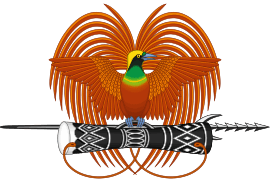1987 Papua New Guinean general election
General elections were held in Papua New Guinea between 13 June and 4 July 1987.[1] The Pangu Party emerged as the largest party, winning 26 of the 109 seats. Voter turnout was 76.0%.
 |
|---|
| This article is part of a series on the politics and government of Papua New Guinea |
|
Executive |
|
Legislature
|
|
Judiciary
|
|
Administrative divisions |
|
|
|
Related topics
|
Results
None of the eighteen female candidates were elected, leading to the first all-male National Parliament in Papua New Guinea's history.[2]
Following the elections, all 22 elected independents joined parties, while two National Party MPs defected; the People's Democratic Movement (PDM) gained nine MPs, the People's Action Party eight, the People's Progress Party (PPP) five, and the Pangu Party and United Party one.[3] The three vacant seats were later won by the National Party, PDM and PPP.[4]
| Party | Votes | % | Seats | +/– | |
|---|---|---|---|---|---|
| Pangu Party | 408,082 | 14.9 | 26 | –25 | |
| People's Democratic Movement | 298,715 | 10.9 | 17 | New | |
| People's Progress Party | 168,280 | 6.4 | 5 | –9 | |
| Melanesian Alliance Party | 153,611 | 5.6 | 7 | –1 | |
| National Party | 135,761 | 5.0 | 12 | –1 | |
| League for National Advancement | 132,001 | 4.8 | 3 | New | |
| People's Action Party | 87,836 | 3.2 | 6 | New | |
| United Party | 87,243 | 3.2 | 1 | –8 | |
| Morobe Independent Group | 60,922 | 2.2 | 4 | New | |
| Papua Party | 34,636 | 1.3 | 3 | 0 | |
| Papua Besena | 17,122 | 0.6 | 0 | –3 | |
| Wantok Party | 17,028 | 0.6 | 0 | New | |
| Country Party | 10,743 | 0.4 | 0 | New | |
| Leiba Party | 2,611 | 0.1 | 0 | New | |
| National Settlement Party | 164 | 0.0 | 0 | New | |
| Independents | 1,117,635 | 40.9 | 22 | +18 | |
| Vacant | – | – | 3 | – | |
| Invalid/blank votes | – | – | – | ||
| Total | 2,732,390 | 100 | 109 | 0 | |
| Votes cast | 1,355,477 | – | |||
| Registered voters/turnout | 1,843,128 | 76.0 | |||
| Source: Saffu, Nohlen et al. | |||||
Aftermath
The newly elected Parliament met on 5 August to elect the Prime Minister. Incumbent Prime Minister Paias Wingti defeated former Prime Minister Michael Somare by a vote of 54 to 51.[5] Wingti formed a 25-member cabinet, with Minister of Education Aruru Matiabe also serving as Acting Foreign Minister due to the previous incumbent Ted Diro being accused of corruption during an ongoing inquiry.[6][5] Diro was instead appointed as a minister without portfolio.[6]
| Wingti cabinet | |
|---|---|
| Position | Minister |
| Prime Minister | Paias Wingti |
| Deputy Prime Minister Minister for Trade and Industry | Julius Chan |
| Minister for Administrative Services | Johnson Maladina |
| Minister for Agriculture and Livestock | Gai Duwabane |
| Minister for Civil Aviation | Hugo Berghuser |
| Minister for Communications | Gabriel Ramoi |
| Minister for Corrective Institutions | Aron Noaio |
| Minister for Defence | James Pokasui |
| Minister for Education | Aruru Matiabe |
| Minister for Environment and Conservation | Perry Zeipi |
| Minister for Finance and Planning | Galeva Kwarara |
| Minister for Fisheries and Marine Resources | Alan Ebu |
| Minister for Forests | Tom Horik |
| Minister for Health | Tim Ward |
| Minister for Home Affairs and Youth | Eserom Burege |
| Minister for Housing | Tom Amaiu |
| Minister for Justice | Albert Kipalan |
| Minister for Labour and Employment | Masket Iangalio |
| Minister for Lands and Physical Planning | Kalas Swokim |
| Minister for Minerals and Energy | John Kaputin |
| Minister for Police | Legu Vagi |
| Minister for Public Service | Dennis Young |
| Minister for Transport | Roy Yaki |
| Minister for Works | Aita Ivarato |
| Minister without Portfolio | Ted Diro
References
External links |